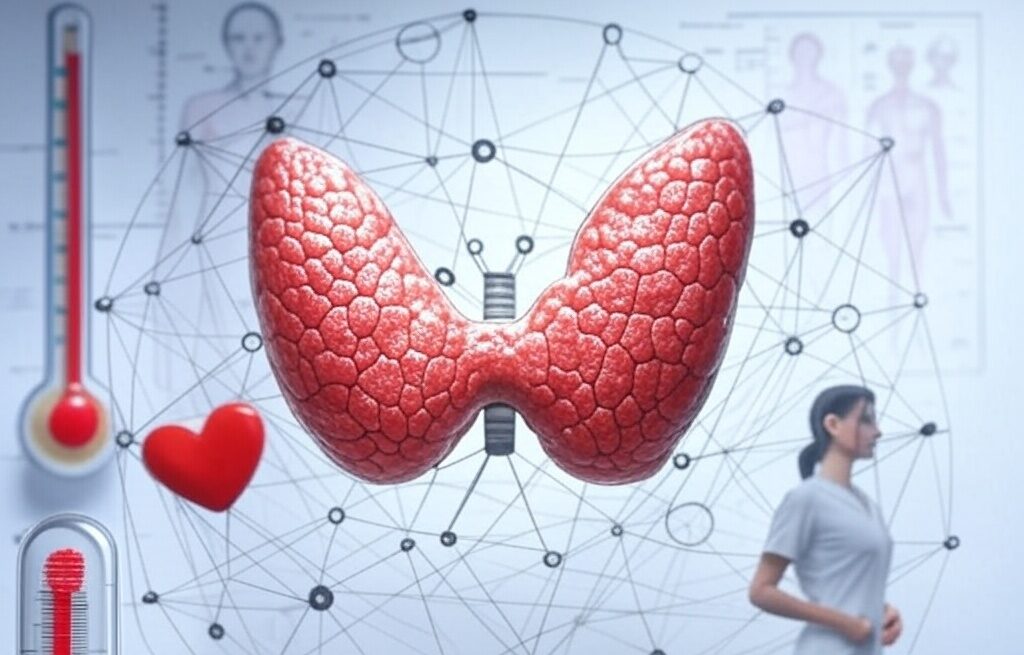
Understanding Hypothyroidism: Beyond Unreliable Blood Tests
The thyroid gland, a small butterfly-shaped organ in your neck, plays a massive role in regulating your metabolism, energy levels, and overall health. When it’s not functioning properly—a condition known as hypothyroidism—it can throw your entire system out of whack. Fatigue, weight gain, and feeling cold all the time are just the tip of the iceberg. But here’s the kicker: the standard blood tests used to diagnose hypothyroidism aren’t always reliable. In this article, we’ll dive into why that is, explore common and lesser-known symptoms of hypothyroidism (including sub-clinical cases), and share insights from experts like Dr. Broda Barnes, Danny Roddy, Georgi Dinkov, and Dr. Ray Peat on better ways to assess thyroid health.
The Problem with Thyroid Blood Tests
If you’ve ever gone to a doctor complaining of tiredness or unexplained weight gain, chances are they ordered a thyroid blood test. These tests typically measure Thyroid Stimulating Hormone (TSH) and sometimes thyroid hormones like T4 and T3. The idea is simple: high TSH or low T4/T3 levels suggest hypothyroidism. But according to pioneering researchers, this approach often misses the mark.
Dr. Broda Barnes, a physician who spent over 50 years studying thyroid disorders, argued that blood tests fail to catch many cases of hypothyroidism. In his book Hypothyroidism: The Unsuspected Illness, he estimated that a huge chunk of the population—potentially over 40% in his time—had undiagnosed low thyroid function. Why? Because blood tests don’t always reflect how thyroid hormones are working in your tissues.
Danny Roddy, an independent health researcher, echoes this sentiment. Drawing on Barnes’ work and that of Dr. Ray Peat, Roddy points out that blood tests can show “normal” results even when symptoms scream hypothyroidism. He advocates for looking at symptoms and trying thyroid hormone supplementation as a diagnostic tool, rather than relying solely on lab numbers.
Georgi Dinkov, often featured in health podcasts, ties into discussions like a BMJ article that highlights how blood tests can misclassify people with subclinical hypothyroidism. The article notes that factors like stress, fasting, or even intense exercise can skew results, leading to false negatives.
Dr. Ray Peat, a biologist with decades of research under his belt, takes it a step further. He argues that blood tests are fundamentally flawed because they don’t account for how your body uses thyroid hormones. Factors like stress hormones (think cortisol) or diets high in unsaturated fats can suppress your tissues’ response to thyroid hormones, making blood levels misleading. Peat pushes for older, more holistic methods—like checking your basal metabolism or pulse rate—to get a clearer picture.
So, what’s going wrong with these tests? Here are the main culprits:
- Broad Reference Ranges: “Normal” TSH ranges are so wide that mild hypothyroidism often slips through the cracks. Peat suggests optimal TSH should be much lower—around 0.4—than what labs consider acceptable.
- External Influences: Stress, poor diet, or even a tough workout can mess with your TSH and thyroid hormone levels, masking the true state of your thyroid.
- Tissue-Level Issues: Blood tests measure hormones in your bloodstream, not how well they’re working in your cells. If your tissues aren’t responding properly, you could still feel awful despite “normal” results.
- Subclinical Blind Spots: Subclinical hypothyroidism—where symptoms are mild but real—often goes undiagnosed because TSH levels aren’t high enough to raise red flags.
Symptoms of Hypothyroidism: The Common and the Uncommon
Hypothyroidism doesn’t always announce itself loudly. Some symptoms are well-known, while others might surprise you. Sub-clinical hypothyroidism, where thyroid function is sub-optimal but not severe, can also cause issues that are easy to brush off as “just life.” Here’s a breakdown:
Common Symptoms
These are the ones you’ve probably heard about:
- Fatigue: Feeling drained no matter how much you sleep.
- Weight Gain: Packing on pounds despite no change in diet or exercise.
- Cold Intolerance: Always reaching for a sweater, even in warm weather.
- Dry Skin and Hair Loss: Flaky skin and thinning hair that no moisturizer or shampoo can fix.
- Constipation: Sluggish digestion that won’t budge.
- Depression: A low mood that lingers without clear cause.
- Muscle Weakness: Feeling like your workouts are harder than they should be.
- Menstrual Irregularities: Heavy, irregular, or painful periods.
Uncommon Symptoms
These are less talked about but just as real:
- Carpal Tunnel Syndrome: Tingling or pain in your hands and wrists.
- Infertility: Struggling to conceive without an obvious reason.
- High Cholesterol: Stubbornly elevated levels, even with a healthy diet.
- Slow Heart Rate: A pulse that’s sluggish, often under 60 beats per minute.
- Hoarseness: A raspy voice that won’t go away.
- Facial Swelling: Puffy face or eyes, especially in the morning.
- Brittle Nails: Nails that crack or peel easily.
Sub-Clinical Hypothyroidism
This is the gray area where symptoms are milder but still impact your life. You might notice:
- Occasional fatigue that’s not debilitating but drags you down.
- Slight weight gain that’s hard to shake.
- Feeling a bit colder than others in the same room.
- Subtle mood dips or brain fog that make you less sharp.
These symptoms, especially in sub-clinical cases, can fly under the radar. But as Barnes, Peat, and Roddy point out, they’re often clues that your thyroid isn’t firing on all cylinders.
Better Ways to Assess Thyroid Health
If blood tests aren’t the gold standard, what is? The experts we’ve mentioned lean on practical, time-tested methods to gauge thyroid function. Here are some approaches they recommend:
Basal Temperature Test
Dr. Barnes popularized this one. First thing in the morning, before getting out of bed, place a thermometer under your armpit for 10 minutes. A temperature below 97.8°F (36.6°C) could suggest hypothyroidism, especially if you have symptoms. Women should avoid testing during menstruation for accuracy.
Pulse Rate Monitoring
Dr. Peat and Danny Roddy emphasize checking your resting pulse. A slow pulse—say, below 70 beats per minute—can hint at low thyroid function. Track it consistently to spot patterns.
Symptom Checklist
Write down everything you’re experiencing, from fatigue to brittle nails. Barnes and Peat stress that symptoms often tell a clearer story than lab results. If you check multiple boxes (like cold hands, hair loss, and low energy), it’s worth digging deeper.
Therapeutic Trial
Roddy and Peat suggest a trial of thyroid hormone supplementation (under medical supervision, of course). If your symptoms improve with a low dose of something like Armour Thyroid, it’s a strong sign your thyroid needed support.
These methods aren’t perfect, but they offer a more holistic view than blood tests alone. They focus on how you feel and how your body is functioning, not just numbers on a lab report.
Why This Matters
Hypothyroidism isn’t just about feeling tired—it can affect your heart, fertility, mental health, and more. Sub-clinical cases, where symptoms are subtle, can still chip away at your quality of life over time. Relying solely on blood tests risks missing the chance to address these issues early.
The insights from Dr. Broda Barnes, Danny Roddy, Georgi Dinkov, and Dr. Ray Peat remind us to listen to our bodies. If you’re struggling with symptoms like fatigue, weight gain, or even something as unexpected as carpal tunnel, don’t let “normal” blood work dismiss your concerns. Explore alternatives like temperature checks or pulse monitoring, and work with a healthcare provider who’s open to looking beyond the lab.
Final Thoughts
Your thyroid is a powerhouse, but it’s also finicky. Standard blood tests can help, but they’re not the whole story. By understanding the limitations of these tests and recognizing both common and uncommon symptoms, you’re better equipped to advocate for your health. Whether it’s tracking your morning temperature or noting how often you’re reaching for a blanket, small steps can lead to big insights. Hypothyroidism doesn’t have to stay “unsuspected”—with the right approach, you can uncover what’s really going on and feel like yourself again.
Want to learn more? Check out Dr. Broda Barnes’ book Hypothyroidism: The Unsuspected Illness or dive into Dr. Ray Peat’s articles at raypeat.com for a deeper understanding of thyroid health.




